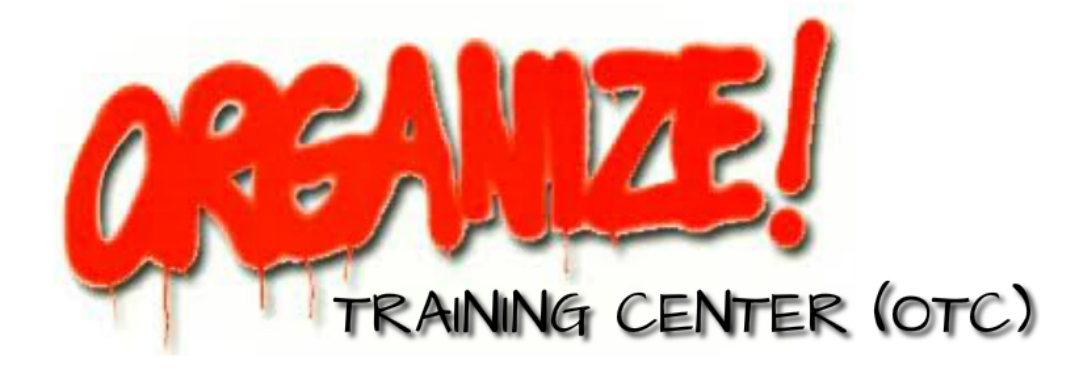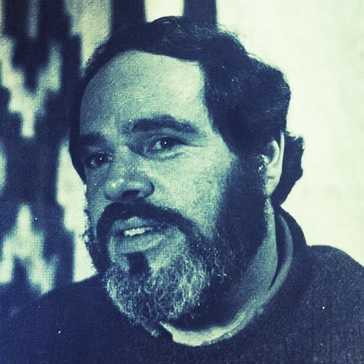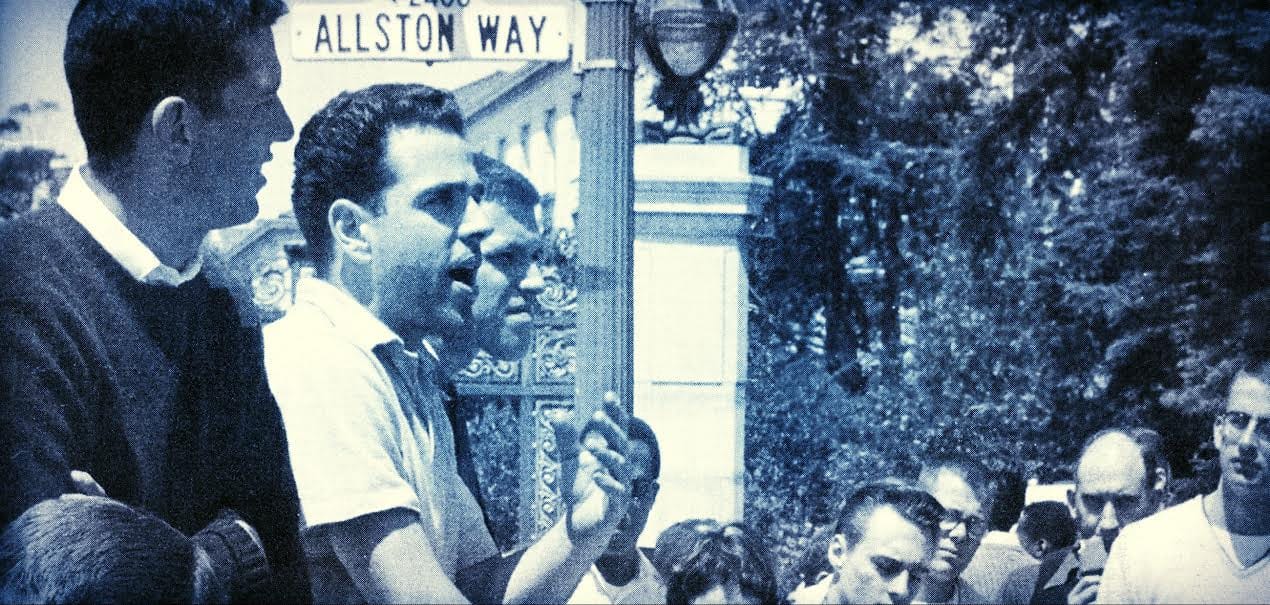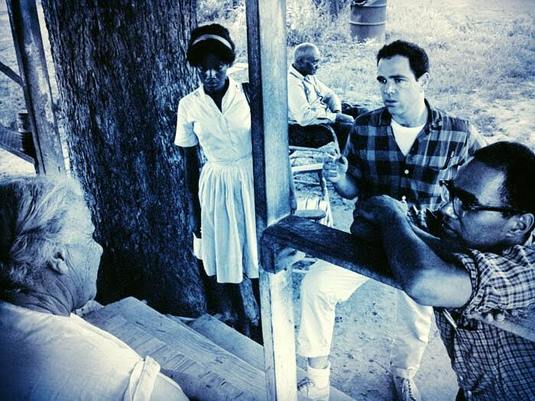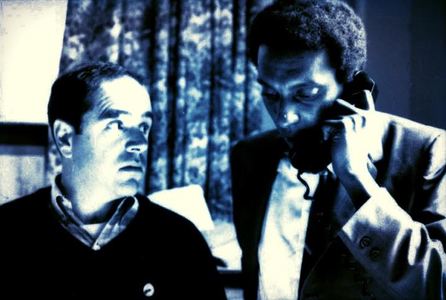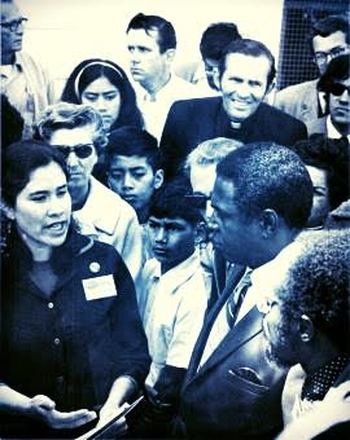History of OTC
|
The ORGANIZE! Training Center was founded by its Executive Director, Mike Miller, in San Francisco in 1972.
Internationally, OTC has participated in workshops, engaged in consultation, and otherwise shared experience with those who share OTC's core values, in Brazil, Poland, Bulgaria, and Israel, as well as in a special consultation with an Eastern European leader of the Roma people. Participants in OTC intensive workshops held in the US have come from Asia, Africa, Australia, New Zealand, Israel, Palestine, Western Europe, Poland, and Romania. For twenty years, OTC annually led two to four national four- and five-day workshops on community organizing. These workshops presented an overview of organizing as well as an introduction to basic philosophy, strategy and tactics. |
Participants came from all over the world, and included grassroots leaders as well as executives from national denominations and leaders of national organizations. (This workshop is now only available to groups who contract with OTC for its presentation.)
Because of fundamental changes in the organizational environment within which OTC works, the organization decided to make a major shift in program emphasis in 1992. OTC now engages in more specialized efforts, seeking to:
Because of fundamental changes in the organizational environment within which OTC works, the organization decided to make a major shift in program emphasis in 1992. OTC now engages in more specialized efforts, seeking to:
- develop a program of value-based political education;
- devote more time to research, writing and education;
- continue its consulting work with a limited number of groups;
- engage in international solidarity by participating in educational activities designed to assist organizers and leaders in other countries interested in developing a strong civil society;
- facilitate efforts that would lead to increased cooperation and collaboration among present national organizing networks;
- otherwise serve as an incubator for emerging new efforts in the organizing field, and;
- extend its work into the American labor movement by means of the Project for Labor Renewal. (This program ended in 2002).
From 1993-1999, OTC was the principal consultant to Christians Supporting Community Organizing, a national effort aimed at involving churches of Evangelical, Holiness, Pentecostal, and related faith perspectives in already existing congregation-based community organizing projects around the country that focus their efforts on social and economic justice and extending democracy to marginalized groups.
In 1997, OTC initiated the "Project for Labor Renewal," an effort to work with union locals in the San Francisco Bay Area that were interested in the transformation of their organizational cultures so that impediments to full-scale participation on the part of rank-and-file members could be overcome. This effort began with an 18-month exploratory period during which the basic ideas of our approach were presented to a cross-section of leaders in Bay Area union locals. The Project's "action phase" was kicked off March 19-21, 1999, at a 3-day workshop for locals who wanted to pursue the work of internal renewal with OTC's assistance. The results of this work were published in “Renewing Labor,” available from OTC (see Writings).
In 1997, OTC initiated the "Project for Labor Renewal," an effort to work with union locals in the San Francisco Bay Area that were interested in the transformation of their organizational cultures so that impediments to full-scale participation on the part of rank-and-file members could be overcome. This effort began with an 18-month exploratory period during which the basic ideas of our approach were presented to a cross-section of leaders in Bay Area union locals. The Project's "action phase" was kicked off March 19-21, 1999, at a 3-day workshop for locals who wanted to pursue the work of internal renewal with OTC's assistance. The results of this work were published in “Renewing Labor,” available from OTC (see Writings).
Until 2002, OTC published the quarterly, "The Organizer Mailing." OTC supports the writing and research activities of its Executive Director and publishes articles and other educational materials in the field of organizing and subjects of related interest. The OTC Publications Catalog offers original articles and reprints on subjects of interest to community and labor organizers, as well as those who have an interest in the field. Items in the Catalog are especially useful for teaching organizing and for people in labor, religious, foundation and other fields that support organizing (see Writings).
What Came Before OTC
Mike Miller was a student at the University of California at Berkeley in the 1950s. In late 1957, he resigned in protest from his position as a representative on the Associated Students Board over what he called "sandbox politics." The next semester, he organized a group of student leaders to run as a "slate" for student government office on a platform supporting racial equality, free speech on campus, voluntary ROTC, and participation in the National Student Association. This "slate" quickly rejuvenated interest in serious student politics on campus.They doubled the electorate and received between 35-40% of the vote. Encouraged, the candidates, joined by Miller and others (including Charleen Rains, Owen Hill, Patrick Hallinan, Peter Franck, and Fritjof Thygeson) formally established SLATE as a campus political party in February 1958. SLATE was involved with both on-and off-campus issues. They led protests against compulsory ROTC, against the House Un-American Activities Committee, against racial discrimination, and against the death penalty. The organization and its work were quickly noted across the country.
Miller graduated from the UC Berkeley in 1958. After Berkeley, he worked as a tenant organizer for the Henry Street Settlement House on New York’s Lower East Side. In 1960, he was fired from the job for being "too militant," and dubbed "a little Alinsky," but had to ask an acquaintance what that epithet meant. Shortly after being fired, Miller tagged along with a friend to Alinsky's summer home in Carmel. When Alinsky enquired as to what Miller was doing there, he replied, "I was fired for being 'a little Alinksy,' so I wanted to meet the big one." (A few years later, in October of 1966, Miller was hired by Alinsky and worked with him in Kansas City Missouri on behalf of the the Industrial Areas Foundation (IAF).)
|
Miller subsequently returned to the San Francisco Bay Area. By late fall of 1962, he had joined the full-time staff of the Student Non-violent Coordinating Committee (SNCC) and worked in the San Francisco Bay Area. In December of 1962, Sam Block and Willie McGee, two SNCC Mississippi Project staff who were on a fund-raising tour to the San Francisco Bay Area, invited Miller to participate in the voter registration campaign in the northwestern plantation counties of the Mississippi Delta.
In 1963, Miller went to Mississippi to serve as a field secretary in Greenwood, in Leflore County, where he worked in a variety of support functions for the Movement there. |
|
Typically, SNCC began their campaigns by exploring the economic and political history of a target community. Field workers were supplied with detailed information on a community’s economic and financial power structure.
By the spring of 1963, SNCC had 20 staff members and six offices in Mississippi. By August of 1963, SNCC had projects and permanent staff in a dozen Mississippi communities. Furthermore, there were 12 workers in SNCC's Atlanta headquarters, and 60 field secretaries and 121 full-time volunteers working in projects in the Black Belt counties of Arkansas, Alabama, and Georgia, as well as SNCC projects in Danville, Virginia and elsewhere in the deep South. |
Like other SNCC staff, and other members of the Mississippi Council of Federated Organizations (COFO), an umbrella organization set up to end duplication of efforts among local and national civil rights groups, Miller faced acts of lawlessness from whites who wished to keep the status quo. For example, he and two companions were run off the road in Tchula, in Holmes County, Mississippi. The local hospital refused to provide the needed medical treatment for the three so the town’s African American undertaker took them to the University Hospital in Jackson, Mississippi, for the medical treatment that saved their lives.
Despite such acts of lawlessness, SNCC decided to send volunteers to Mississippi for Freedom Summer 1964. According to SNCC’s Mississippi Project Director, Bob Moses, Freedom Summer’s goals were to expand black voter registration in Mississippi, organize a legally established “Freedom Democratic Party” to challenge the whites only Mississippi Democratic Party, to establish “freedom schools;” and to open community centers to help African Americans obtain legal and medical assistance. Miller worked for a short time in Hattiesburg, Mississippi, in 1963, but did not participate in Freedom Summer.
Despite such acts of lawlessness, SNCC decided to send volunteers to Mississippi for Freedom Summer 1964. According to SNCC’s Mississippi Project Director, Bob Moses, Freedom Summer’s goals were to expand black voter registration in Mississippi, organize a legally established “Freedom Democratic Party” to challenge the whites only Mississippi Democratic Party, to establish “freedom schools;” and to open community centers to help African Americans obtain legal and medical assistance. Miller worked for a short time in Hattiesburg, Mississippi, in 1963, but did not participate in Freedom Summer.
|
In October of 1966, Miller took a job working for the Industrial Areas Foundation (IAF) with Saul Alinsky in Kansas City, Missouri.
In the summer of 1968, Miller returned to San Francisco, his hometown, where he began serving as the Mission Coalition Organization staff director --with a self-imposed three year limit based on Alinsky theory of the role of the outside organizer. During this time, Miller helped facilitate the popular mobilization of a vast coalition of diverse ethnic, neighborhood, ideological, and religious groups in the Mission District. At its peak in 1971, more than 500 people were participating in daily and weekly activities of the MCO, including activities on schools, parks, employment, tenants’ rights, social services -- and dealing with government agencies on all levels. MCO’s total membership at that time was 10,000. (To read more about Miller's life from childhood through his work with Alinsky in 1966, see this Oral History/Interview. For more about his involvement with the MCO, see Reviews for his book A Community Organizer's Tale or order the book through OTC'S Book Store.) |
Quote at the top of the page by Martin Luther King, Jr.
(415) 648.6894 mikeOTCmiller@gmail.com 442 Vicksburg, San Francisco, CA 94114
Copyright© Since 2016, ORGANIZE! Training Center. All rights reserved.
Copyright© Since 2016, ORGANIZE! Training Center. All rights reserved.
